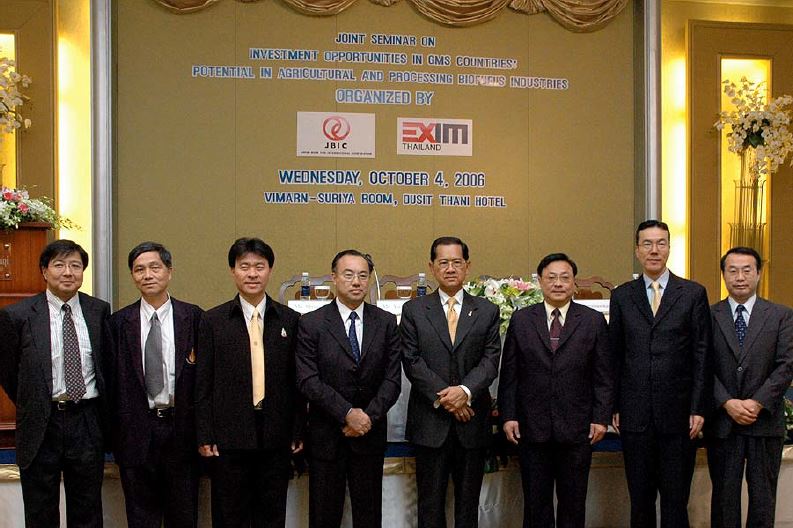
EXIM Thailand and JBIC promote investment opportunities to Thai and Japanese business operators with potential to develop agro-business and biofuel industries in the GMS in a bid to help enhance agricultural and industrial productivity as well as alternative energy development in Asia. Dr. Apichai Boontherawara (third right), President of Export-Import Bank of Thailand (EXIM Thailand), said that EXIM Thailand, in cooperation with Japan Bank for International Cooperation (JBIC), organized a seminar titled “Investment Opportunities in GMS Countries: Potential in Agricultural Processing and Biofuels Industries” on October 4, 2006 at Dusit Thani Hotel, Bangkok. The opening speeches were delivered by Dr. Narongchai Akrasanee (fourth right), Chairman of the EXIM Thailand’s Board of Executive Directors and Mr. Wataru Yoshida (fourth left), JBIC’s Resident Executive Director for Asia and Oceania.According to Dr. Apichai, the abundance of natural resources, farm produce
including energy crops and agricultural workforce contributes to the plentiful investment opportunities in the Greater Mekong Subregion (GMS), particularly in the agro-business industry. EXIM Thailand and JBIC are, therefore, working in partnership with related Thai and Japanese public and private sectors to furnish entrepreneurs from both countries with information and financial support necessary for their long-term business success. GMS industries with good prospects include animal feed, processed seafood, processed vegetable and fruits, rubber products, organic agricultural products and alternative energy industry. Foreign investors in the GMS can also enjoy increasingly accessible raw materials, labor and tax benefits for export to major markets such as the United States and European Union. These factors help reduce production costs for Thai and Japanese manufacturers, curtail cost of alternative energy development in Thailand and the overall GMS while expanding intraregional trade and investment in Asia. EXIM Thailand President added that the Thai-Japanese collaboration would promote the exchange of information, production technology and international business management capabilities among Thai, Japanese and GMS entrepreneurs. This will lead to quantity and quality enhancement in the GMS agricultural sector, boosting domestic sale and consumption, raising farm input for the Thai and Japanese industries as well as increasing re-export to third countries. Meanwhile, improvements of the GMS’s agricultural sector, especially in the agro-business and alternative energy development industries, would contribute to agricultural and agro-business development and, ultimately, strengthen the overall economic growth of Asia in the long run.